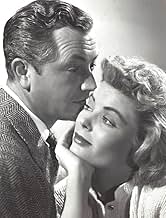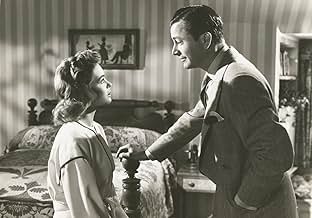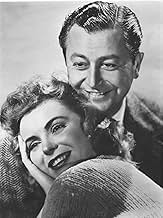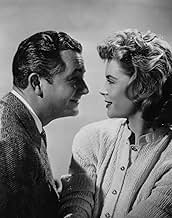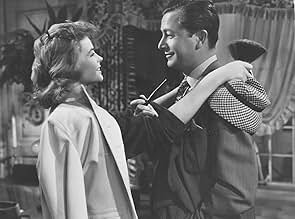अपनी भाषा में प्लॉट जोड़ेंThe follow-up to the hit film "Claudia" (1943) finds the title character (Dorothy McGuire) and her husband David (Robert Young) dealing with the ups and downs of marriage and parenthood in t... सभी पढ़ेंThe follow-up to the hit film "Claudia" (1943) finds the title character (Dorothy McGuire) and her husband David (Robert Young) dealing with the ups and downs of marriage and parenthood in their rural Connecticut town. Illness, accidents, and jealousy plague the young couple as t... सभी पढ़ेंThe follow-up to the hit film "Claudia" (1943) finds the title character (Dorothy McGuire) and her husband David (Robert Young) dealing with the ups and downs of marriage and parenthood in their rural Connecticut town. Illness, accidents, and jealousy plague the young couple as they learn to weather life.
- पुरस्कार
- कुल 2 जीत
- Farmer
- (बिना क्रेडिट के)
- Mrs. Barry
- (बिना क्रेडिट के)
- Charlie
- (बिना क्रेडिट के)
- Mr. Riddle
- (बिना क्रेडिट के)
फ़ीचर्ड समीक्षाएं
Back in 1943, Dorothy McGuire and Robert Young made an incredibly odd film, "Claudia". The title character (played by McGuire) was a ditsy lady who almost needed her mother and father to take care of her because she was so dependent and slow-witted. It seemed like a comedy through much of the film...yet it also was about death! Now, three years later the pair are back for "Claudia and David" and once again it's a very strange combination of moods. The beginning finds Claudia a comical lady who drives like a complete idiot and is totally scatterbrained. Yet, after a while, her son nearly dies from the Measels and her husband is nearly killed in an accident. Along the way, all sorts of angst occurs--stuff you'd NEVER expect given the film's set-up. Overall, I found the film baffling and not altogether enjoyable. A strange melange, that's for sure.
The comedy comes in the first 5 minutes. After that, it's high-class soap opera with an outstanding cast. Was there ever a more winning screen personality than McGuire or a more comfortable pipe smoker than Young. Together, they're nearly ideal. We know that despite their clichéd trials and tribulations, they'll emerge together in the end. Two scenes stay with me. When Young starts tickling wife on top their bed, we know what follows-- rather suggestive for the time. Still, it's done with such unforced naturalness and good humor, who could object. The other is the deeply felt confrontation between McGuire and Mrs. Dexter (Hobart). It's one of the more touchingly humane scenes of that period and stands as the movie's well-wrought centerpiece. All in all, this brief 73 minutes is a prime example of how effectively Hollywood could turn out slick little programmers during its illustrious studio period.
Most reviewers have recognized Claudia as a rather immature, dim-witted young woman who needed someone to look after her. Personally, I recognized her as an upper-class, fashionable, and younger version of "Edith Bunker." Apparently Claudia had been protected and watched over by her parents and never had to fend for herself. Once on her own, except for the "snoopervision" of her husband David, she takes unwise and dangerous chances and has to face the fact that tragedy and death loom all around her but are unseen in her idyllic world. She does begin to grow up when she acknowledges the pain she felt over her father's death and her mother's unfortunate diagnosis and eventual death. She further matures when she becomes the mother of little Bobby and must deal with a childhood disease that could have proven fatal to her precious child. She also shows maturity when she sympathizes with Mrs. Dexter about the tragic death of the Dexters' only child, an event that has caused emotional problems for the bereaved Dexter couple.
While watching the film, I was appalled by the self-centeredness and "know-it-all" attitude exhibited by David, something other reviewers did not mention. As a viewer, I was angered by the way he chided Claudia for her motherly concern and made light of Bobby's serious illness. To me, it seemed he saw the child as the latest toy or source of entertainment for Claudia and something he personally saw as a nuisance and an annoyance. Quite a few times he criticized Claudia for paying attention to the child, and his words and actions struck me as terribly childish, selfish, insensitive, and irresponsible. I thought of the caring, supportive father Robert Young later portrayed in the "Father Knows Best" TV series, and that is why I gave my review the title that reads "Father DOES NOT know best!"
While it is true that the film shows the limited gender roles accepted and exhibited by the young adults of the World War II generation, the film leads today's viewers to realize how the generations since that time have benefited from world-wide communication, practical approaches to education in public school, counseling, parenting classes, and the new ideas about gender roles and the concept of marriage and responsibility. Yes, we all have come a long way and are much more grown up now.
क्या आपको पता है
- ट्रिवियाThis 1946 sequel, three years after the original film, shows that the Connecticut farm now has electricity, but they drive the same old station wagon. Also, the telephone is no longer a party line as they don't count the number of rings before answering.
- भाव
Claudia Naughton: What makes men think women are bad drivers?
David Naughton: Women drivers.
टॉप पसंद
विवरण
- रिलीज़ की तारीख़
- कंट्री ऑफ़ ओरिजिन
- भाषा
- इस रूप में भी जाना जाता है
- Cláudia e David
- फ़िल्माने की जगहें
- उत्पादन कंपनी
- IMDbPro पर और कंपनी क्रेडिट देखें
- चलने की अवधि1 घंटा 18 मिनट
- रंग
- पक्ष अनुपात
- 1.33 : 1
इस पेज में योगदान दें




